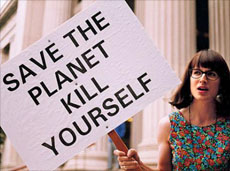Several years ago, I remember watching a story on the efforts to save India’s gharial crocodile. On the verge of extinction, it is the most endangered crocodile on the planet. After sending out thousands of gharials into the wild, only 200 breeding adults are left. I remember marveling at the lengths the researchers and volunteers were going to save this prickly, yet majestic animal.
 And then I asked myself, “Why?” If the gharial crocodile is just a product of random mutations and that were selected by nature, why would anyone try and save it? Why not let natural selection take its course and let the gharial go extinct? In our creation-free, science-only mindset, why were we not celebrating the extinction of the gharial? I mean, some other species will adapt and take its place in the ecosystem; Darwin’s natural selection once again proved. That is cause for celebration right?
And then I asked myself, “Why?” If the gharial crocodile is just a product of random mutations and that were selected by nature, why would anyone try and save it? Why not let natural selection take its course and let the gharial go extinct? In our creation-free, science-only mindset, why were we not celebrating the extinction of the gharial? I mean, some other species will adapt and take its place in the ecosystem; Darwin’s natural selection once again proved. That is cause for celebration right?
And yet conservation efforts by humans abound. Why? Why try and subvert the process of natural selection? Some would say it is because humans are causing the extinction of these species. But if we are better adapted to our environment and the gharials can’t adapt well enough to deal with us, then why not let them die out. Is it not the survival of the fittest? Are humans not the species able to adapt to nearly any environment? Are we not the most fit to survive just about anywhere? Then why do we care about species that can’t make it on their own?
And yet even the most die-hard Darwinian atheist would applaud the conservation efforts of anyone trying to save an endangered species. Why? I believe it is because humans inherently know that we are charged with being the curators of God’s creation. We are meant to protect and preseve our environment because it has inherent value beyond simple randomness. We want to and should save the gharial crocodile because that is our charge. We know it even if we do not believe that there is a Creator that has given us that charge.
I think caring for our environment and the other species in it goes beyond just a desire to preserve our habitat, I think it is a hard wired understanding that humans have been entrusted with caring for this planet and everything on it. And we better not screw it up.
And yet the radical environmentalism that has surfaced in that last decade has taken a scary departure from this idea. Instead of trying to protect and preserve nature, there is a growing meme that it is the human that needs to go extinct. We have to get rid of ourselves in order that nature survive. Many environmental types truly believe that the planet would be a better place without us and they want us gone. Some range from just asking that we voluntarily do not have children, some want to implement a global one-child policy like China, and some hope for an outbreak of a virus like Ebola to get rid of what they see as a plague on the Earth.
And yet would Earth be a better place without its curators? I believe I found the answer in Cardinal Joseph Ratzinger’s, now Pope Benedict XVI, collection of essays, In the Beginning: A Catholic Understanding of the Creation and the Fall. He profoundly warns:
Human beings no longer have any use for themselves; they would prefer to put themselves out of the way so that nature might be well again. But this is not how to bring healing to the world, for we go against the Creator when we no longer want to exist as the human beings that he wanted to exist. It is not thus that we heal nature, but rather thus that we destroy ourselves and creation by removing from it the hope that lies in it and the greatness to which it is called.
LifeNews.com Note: Rebecca Taylor is a clinical laboratory specialist in molecular biology, and a practicing pro-life Catholic who writes at the bioethics blog Mary Meets Dolly. She has been writing and speaking about Catholicism and biotechnology for five years and has been interviewed on EWTN radio on topics from stem cell research and cloning to voting pro-life. Taylor has a B.S. in Biochemistry from University of San Francisco with a national certification in clinical Molecular Biology MB (ASCP).







